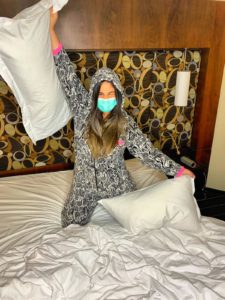Voices down the corridor: Israelis share stories from two of the country’s improvised quarantine facilities
They may not be able to check out any time they like, but they are all hoping to leave.
Ten hotels across Israel have been converted into housing for coronavirus carriers with mild symptoms, as well as for those who are required to be in isolation after having returned from abroad. Additional hotels are being added to the roster each day.
The hotel project is being run by the Israel Defense Forces (IDF) in coordination with the Health and Defense ministries. The goal is to ease the burden on hospitals as the number of COVID-19 cases in the country rises, and more patients require medical care.
There are no doctors on staff at the so-called “corona hotels,” and “guests” are free to move around inside as they please. They can socialize and even hold parties. According to those staying at the Dan Panorama hotel in Tel Aviv, an ambulance is always at the ready to transfer anyone whose symptoms worsen.
Amit Katzav, a 21-year-old hair stylist from the Tel Aviv suburb of Ramat Gan, is staying at the hotel with hundreds of others. She was traveling across the United States after finishing her mandatory IDF service, and contracted novel coronavirus from someone on her flight home on March 17.

Amit Katzav. She says she is remaining positive. (All photos by Amit Katzav, https://www.instagram.com/amit_hair_style/ [1])
“Ten days after I returned, I couldn’t taste or smell anything,” Katzav told The Media Line. “I knew it was one of the symptoms of the virus, so I got tested.”
The Dan Panorama overlooks the city’s famous beach, and the turquoise waters of the Mediterranean. Katzav is there since last Friday.
“I [now] have no symptoms. I feel great and have no fever,” she said.
But it is no holiday.
“The food is really bad. Sometimes in the evening there’s almost no food,” she said, specifying that “dinner” often consists of a tuna sandwich.
To raise people’s morale, Katzav − who brought her hair styling tools to the hotel − has taken to giving guests free haircuts or braiding their hair.

Amit Katzav demonstrates her styling skills on another ‘guest’ at the Dan Panorama Hotel in Tel Aviv.
“In the evening, all the young people get together and put music on to pass the time,” she said. “We have movie nights and a karaoke machine upstairs.”
While most in the hotel have private rooms, a few are sharing rooms with strangers as the facility fills up.
Before they can be released, each resident must test negative twice, thus demonstrating that they have recovered from a disease that has swept the world and claimed tens of thousands of lives.
A staff member at one of the hotels who asked to remain anonymous told The Media Line that all those working at the coronavirus hotels wear protective gear such as gloves and masks at all times. Guests are asked to return to their room when staff clean public spaces and distribute meals.
“It’s extremely difficult for everybody,” the staff member said. “You don’t know how many guests are coming to the hotel each day.” But “we treat the people coming in as well as we can…. Yes, they’re sick, but they’re still human beings and they deserve love and care as much as we’re able to give them.”

Not your average hotel food.
On a Facebook page dedicated to coronavirus-positive Israelis – the name translates into English as “Israeli Coronavirus Patients Revealed” – some of those at the Dan Panorama revealed that they are required to check their vital signs on a daily basis using a medical kit provided for this purpose. They then forward the data to medical professionals by phone.
A woman at one of the hotels who had contracted COVID-19 at a Purim party a few weeks ago said her symptoms began with a cough and a general feeling of weakness.
“Even when the symptoms pass, we still test positive for the virus, which is why we’re being isolated here, but most of us feel good 90% of the time,” she said in a video posted to the Facebook group. “It differs from person to person.”
Oz Gold, a 30-year-old computer technician from the Jewish community of Efrat in the West Bank, has been at the hotel since last Thursday.
“It’s better than the hospital, but our common goal here is to get out and go home,” he told The Media Line. “My wife is at home with two children, and I speak to them over the phone.”
Gold said that once in a while, medical teams come to test the guests. While most in the hotel are in good health and have only mild symptoms, they are all anxious to get out before Passover, which begins at sundown on Wednesday. He himself is waiting for the results of a second coronavirus test to come back negative, in which case he expects he will be allowed to go home.
“I get up in the morning, pray, eat breakfast, speak to friends, eat lunch, and again I go see my friends,” Gold explained, referring to people in the hotel he knew from before the outbreak. “In the evening, I eat dinner and then sit in the lobby to talk to people.”
Confusion over Health Policy
The Kinar Galilee Hotel, in the northern city of Tiberias, is housing roughly 260 Israelis who returned from Italy, one of the world’s coronavirus epicenters, on emergency rescue flights.
Because questions remain over exactly which of the guests have contracted the virus, all have been forced to remain in their room at all times.
Many complain about a lack of information and clear policies.
“After we landed [at Ben-Gurion Airport], it was clear that there was some kind of organizational issue, where the right hand doesn’t know what the left one is doing,” a 29-year-old woman named Eden, who was on a special flight from Milan, told The Media Line.
“The shuttle buses [to the hotel] were filthy, covered in dust, and looked like they were from the 1970s,” she continued. “They were yelling at us on a megaphone to get on the bus. We were packed like sardines – which is a good way to get the virus if we didn’t already have it.”
Eden said that the staff at the Kinar Galilee was very pleasant and helpful, although the resort has severe issues with internet connectivity, meaning that watching videos online, including on Netflix, is mostly out of the question.
What is more concerning to her, though, is that she has been awaiting the results of her COVID-19 test since March 25 despite having been promised an answer within 24 to 48 hours.
“Some of us received our results and others didn’t. Now we’re being told that we might end up going home to continue our quarantine without results,” Eden said.
“Every time I try to get an answer, the [authorities] send me from one place to another. Nobody is telling us anything or updating us,” she said.
Others at the hotel are similarly in the dark about their tests and release date.
“My doctor doesn’t even see that I’m in the system for the [coronavirus] test, which is really frustrating,” Daniela, a 25-year-old studying in Milan, relayed to The Media Line. “I called the hospital myself, reached the laboratory where the tests are, and managed to get the results.”
Though her test showed that she did not have COVID-19, Daniela said she still had no idea when she would be allowed to go home.
For Eliel, 17, the story is much the same.
“I haven’t yet received my results,” she told The Media Line. “We’ve been waiting for them for over a week, and I don’t know who I’m supposed to be in touch with.”
In response to these concerns, the IDF told The Media Line that the army has no say in who is permitted to leave.
“It completely depends on their medical categorization,” a military spokesperson said. “The policy is under the purview of the Health Ministry. Only the doctors can decide when someone is allowed out.”
And no, the hotel is not on a dark, desert highway….